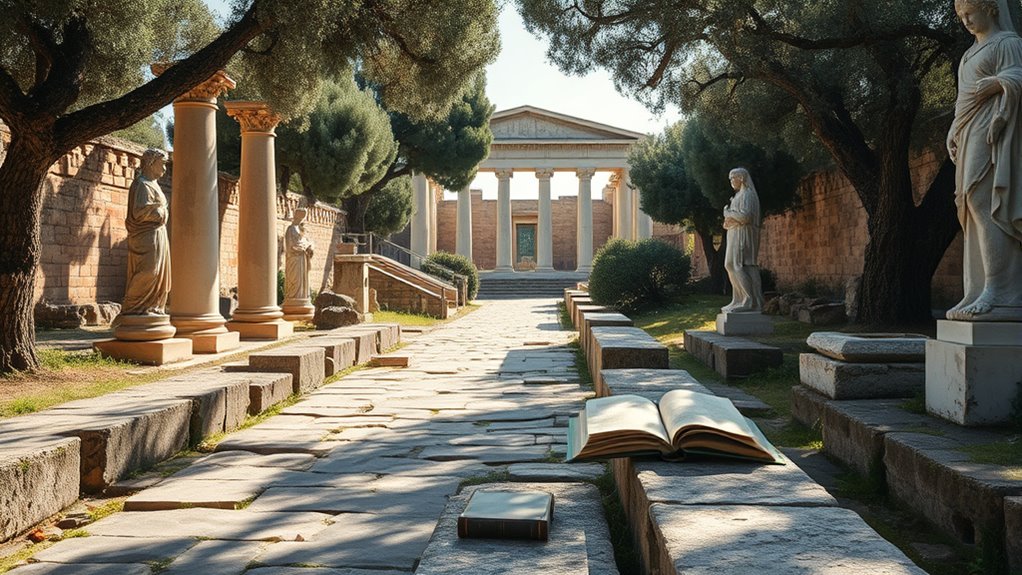Understanding the path from Plato’s Academy to Pyrrhonism shows how doubt evolved from seeking objective truths to embracing perpetual suspension of judgment. Plato relied on rational inquiry and Forms but recognized human limitations. Over time, skeptics like Pyrrho emphasized that perception and reason can deceive, promoting doubt as a means to attain tranquility. If you explore further, you’ll discover how these ideas shaped modern skepticism and the ongoing quest for certainty.
Key Takeaways
- Plato emphasized rational inquiry and the pursuit of eternal Forms, recognizing human perception’s limitations.
- Early skepticism emerged as a response, questioning the certainty of knowledge and the reliability of sensory experience.
- Pyrrhonism developed as a radical form of skepticism, advocating suspension of judgment to attain mental tranquility.
- The philosophical trajectory reflects an evolving understanding of doubt as a tool for probing truth and acknowledging epistemological uncertainty.
- This path illustrates the shift from seeking objective, unchanging truths to embracing perpetual inquiry and the provisional nature of knowledge.

Doubt often begins as a quiet whisper in your mind, subtly challenging what you once believed to be certain. It’s that initial flicker of skepticism that prompts you to question the foundations of your knowledge. This process, known as skeptical inquiry, encourages you to scrutinize your beliefs and examine their validity. As you explore more deeply, you encounter epistemological uncertainty—the recognition that certainty may be elusive or even impossible to attain. This awareness pushes you to reconsider how you justify what you think you know, emphasizing that knowledge might always be provisional rather than absolute.
Doubt prompts deep questioning, revealing the provisional nature of knowledge and the limits of certainty.
Tracing the path from Plato’s Academy to Pyrrhonism reveals a long history of grappling with doubt. Plato, for example, sought to establish objective truths through rational inquiry, believing that certain knowledge could be attained through philosophical reasoning. His method involved dialogues and dialectics aimed at uncovering eternal Forms, which served as unshakable standards of truth. Yet, even within Plato’s framework, there’s an implicit acknowledgment of uncertainty—an understanding that human perception and reasoning are imperfect, and that our grasp of reality might never be complete. This subtle recognition planted the seeds for future philosophical explorations into doubt.
As philosophy evolved, so did the approach to doubt. The Skeptics of ancient Greece, particularly Pyrrho, took skepticism to an extreme, advocating for suspension of judgment in the face of epistemological uncertainty. They argued that because perception is fallible and reason can be deceived, it’s wiser to withhold belief rather than accept uncertain claims as truth. Pyrrhonism, their school of thought, promotes a state of mental tranquility achieved through this perpetual suspension of belief. You might find it compelling—by refusing to commit to certainties, you free yourself from dogma and open your mind to ongoing questioning. Recognizing the importance of philosophical skepticism can further deepen your understanding of how doubt functions as a critical tool in philosophical inquiry, encouraging humility and continuous reflection.
Frequently Asked Questions
How Did Plato’s Academy Influence Later Skeptical Philosophies?
You see, Plato’s influence on skepticism is profound, shaping later thinkers’ doubts about absolute knowledge. The Academy’s legacy encouraged questioning assumptions and exploring uncertainty, laying groundwork for skeptical philosophies. By emphasizing dialectic and the limits of human understanding, Plato’s ideas inspired a tradition of critical inquiry. This skepticism, rooted in the Academy’s teachings, paved the way for Pyrrhonism and other schools that challenge dogmatic claims and promote ongoing questioning.
What Are the Main Differences Between Pyrrhonism and Other Ancient Schools?
Imagine doubt as a compass guiding your philosophical journey. Pyrrhonism’s fundamental distinction lies in its radical suspension of judgment, embracing uncertainty as a method. Unlike Stoics or Epicureans, who seek certainty, Pyrrhonists use a unique methodological approach—questioning everything to achieve tranquility. This contrasts sharply with other ancient schools, which often cling to fixed beliefs, making Pyrrhonism a distinctive path of skeptical inquiry.
Did Pyrrho’s Teachings Directly Impact Modern Philosophical Skepticism?
You might wonder if Pyrrho’s teachings directly influence modern philosophical skepticism. While ancient skepticism, like Pyrrho’s approach, emphasized doubt and suspending judgment, it laid the groundwork for modern doubt. Contemporary skeptics adopt similar methods, questioning assumptions and seeking certainty. So, yes, Pyrrho’s ideas profoundly impacted modern skepticism by demonstrating that doubt can be a powerful tool for philosophical inquiry and personal understanding.
How Did Historical Contexts Shape the Development of Doubt in Philosophy?
You see, historical contexts shape how doubt develops in philosophy through epistemological uncertainties and cultural influences. During times of social upheaval or political instability, thinkers question established truths more intensely, fostering skepticism. Cultural exchanges introduce new ideas, challenging traditional beliefs. These factors push philosophers to explore doubt as a tool for deeper understanding, ultimately influencing the evolution of philosophical skepticism and shaping how we perceive knowledge across different eras.
Are There Contemporary Applications of Pyrrhonist Principles Today?
You might find that pyrrhonist principles, emphasizing practical skepticism, still influence your daily life. When facing uncertain decisions, adopting doubt helps you avoid hasty judgments and consider multiple perspectives. These decision-making strategies promote open-mindedness and caution, encouraging you to suspend judgment until enough evidence appears. Contemporary philosophy and psychology incorporate these ideas, showing that practicing doubt can enhance critical thinking and help you navigate complex, ambiguous situations more thoughtfully.
Conclusion
As you’ve seen, doubt has taken you on a fascinating journey from Plato’s certainty to Pyrrhonism’s endless questioning. Ironically, in seeking absolute truth, you’ve uncovered that doubt itself becomes the only certainty. Maybe, after all, the path of doubt isn’t about finding answers, but about realizing how little we truly know. So, next time you doubt, remember—it’s the one thing you can count on to keep you endlessly curious.









